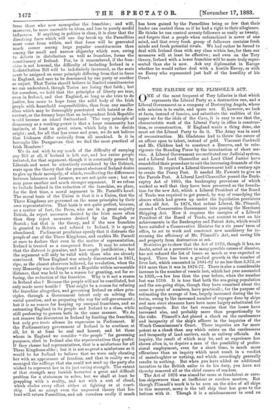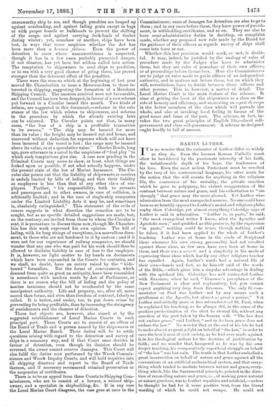THE FAILURE OF MR. PLIMSOLL'S ACT.
ONE of the most frequent of Tory fallacies is that which represents the Liberal Party as a destructive one, and a Liberal Government as a company of Destroying Angels, whose sole mission is to smite, and spare not. If, however, we look at facts, instead of fancies, and substitute the realities of the upper air for the idols of the Cave, it is easy to see that the characteristic work of the Liberal Party in office is construe? tion, or reconstruction. If England wants a thing done, she must set the Liberal Party to do it. The Army was in need of reconstruction. Mr. Gladstone had to throw the career of an officer open to talent, instead of gold. Viscount Cardwell and Mr. Childers had to construct a Reserve, and to rein- vigorate the Standing Force by the introduction of short ser- vice. A Liberal Government reconstituted our Judicial system, and a Liberal Lord Chancellor and Lord Chief Justice have remodelled their procedure to suit the increasing demands of the country. It required a Liberal Government half a century ago to create the Penny Post. It needed Mr. Fawcett' to give us the Parcels Post. A Liberal Lord Chancellor passed the Bank- ruptcy Act of 1869, the bankruptcy provisions of which • worked so well that they have been preserved as the founda- tion for the new Act, which a Liberal President of the Board of Trade was required to get passed, by way of remedying the abuses which had grown up under the liquidation provisions of the old Act. In 1876, that ardent Liberal, Mr. Plimsoll, coerced a Conservative Government into passing the Merchant Shipping Act. Now it requires the energies of a Liberal President of the Board of Trade, not content to rest on his achievements in the Bankruptcy and Patent Acts, which would have satisfied a Conservative Minister for a six years' term of office, to set to work and construct new machinery for in- creasing the efficiency of Mr. Plimsoll's Act, and saving life and property from destruction at sea.
Statistics go to show that the Act of 1876, though it has, no doubt, acted as a preventive to many possible causes of disaster, has not reduced the list of losses so much as was expected or hoped. There has been a gradual growth in the number of lives lost, which amounted in 1881-82 to no less than 3,372, or 644 more than it was in 1876-77. There is also a considerable increase in the number of vessels lost, which last year amounted to 1303,—a few less than the year before, when the number lost was 1310. It is true that both the sea-going population and the sea-going ships, though they have remained about the same in point of numbers, have practically, for the purpose of estimating the average of loss, largely increased during the in- terim, owing to the increased number of voyages done by ships and men since steamers have been more largely substituted for sailing-vessels. But the fact remains that the losses have increased also, and probably more than proportionally to the risks. Plimsoll's Act placed a check on the carelessness and incapacity of the ship's officers in the inquiries of the Wreck Commissioner's Court. These inquiries are far more potent as a check than any which exists on the carelessness and incapacity of land carriers, such as railway officials. An inquiry, the result of which may be, and as experience has shown often is, to deprive a man of the possibility of profes- sional employment, even for a short time, is much more efficacious than an inquiry which must result in a verdict of manslaughter or nothing, and which accordingly generally results in nothing. But when you have added an additional incentive to the British sailor to do his duty, you have not thereby removed all or the chief causes of sea-loss.
The Act of 1876 was aimed far more at fraudulent or care- less shipowners than at inefficient or careless masters. But though Plimsoll's mark is to be seen on the sides of all ships to this moment, many is the tall ship that has gone to the bottom with it. Though it is a misdemeanour to send an unseaworthy ship to sea, and though penalties are heaped up against overloading, and against lading grain except in bags or with proper boards or bulkheads to prevent the shifting of the cargo, and against carrying deck-loads of timber during winter ; yet, somehow or another, ships have been lost, in ways that rouse suspicion whether the Act has been more than a brutuna fulnaen. Even the power of detention in cases where unseaworthiness is suspected, though it has in a few cases probably prevented danger, if not disaster, has yet been but seldom called into action. The temptation to shipowners to send ships to perdition, or to sea with a very good chance of going there, has proved stronger than the deterrent effect of the penalties.
These were the reasons which at the beginning of last year moved Mr. Chamberlain to issue a Memorandum to those in- terested in shipping, suggesting the formation of a Merchant Shipping Council. The answers received were not favourable, and the Council has now been dropped, in favour of a new scheme put forward in a Circular issued this month. Two kinds of reform, are suggested in this document,—reforms in the sub- stance of the law which relates to shipowners, and reforms in the procedure by which the already existing laws can be enforced. The Circular points out that, in many cases, " the loss of a ship is a profitable transaction to its owners." " The ship may be insured for more than its value ; the freight may be insured out and home, and recovered without deduction for expenses which will not have been incurred if the vessel is lost ; the cargo may be insured above its value, or at a speculative value." Charles Reade, long ago, gave utterance in a novel to the suspicions of " foul play " to which such temptations give rise. A case now pending in the Criminal Courts may serve to show, at least, what things are looked upon as possible, if not what actually happens, under the present state of the law of Marine Insurance. The Cir- cular also points out that the liability of shipowners as carriers is unduly limited by bills of lading, and that their liability as employers is less than that of any other class of em- ployers. Further, " his responsibility, both to servants and passengers and to other owners, in case of collision, is arbitrarily limited ; and in the case of single-ship companies under the Limited Liability Acts it may be, and sometimes is, absolutely extinguished." This statement of the evils of course suggests in what direction the remedies are to be sought, but as no specific detailed suggestions are made, but, on the contrary, are invited from those to whom the Circular is sent, it is premature to discuss them now, though Mr. Chamber- lain has this week expressed his own opinion. The bill of lading, with its long strings of exceptions, is a marvellous docu- ment, to those who are not hardened to it by custom ; and if it were not for our experience of railway companies, we should wonder that any one who was paid for his work should thus be allowed to disclaim liability in case of loss to the employer. It is, however, no light matter to lay hands on documents which have been expounded in the Courts for centuries, and we shall, no doubt, have an outcry raised by the " hide- bound" formalists. But the forms of conveyances, which descend from quite as great an antiquity, have been remoulded in accordance with modern needs by Act of Parliament, so there is no reason why the bill of lading and the policy of marine insurance should not be overhauled by the same omnipotent authority. Life and property, are, after all, more sacred than forms, and even than freedom of contract, falsely so called. It is better, and easier, too, to put down crime by preventing its being profitable, than by increasing the stringency of punishments and the chances of detection.
These last objects are, however, also aimed at by the suggested establishment of Local Marine Courts in each principal port. These Courts are to consist of an officer of the Board of Trade and a person named by the shipowners or the Local Marine Board. Their duties will be to settle questions arising with regard to the detentioir and survey of ships in a summary way, and if that Court once decides in favour of detention, even though its decision should be reversed, the owner cannot recover damages. This Court will also fulfil the duties now performed by the Wreck Commis- sioners and Wreck Inquiry Courts, and will hold inquiries into all shipping disasters and report to the Board of Trade thereon, and if necessary recommend criminal prosecution or the suspension of certificates. There is to be an appeal from these Courts to Shipping Com- missioners, who are to consist of a lawyer, a retired ship- owner, and a specialist in shipbuilding, &c. If in any case the Local Marine Court disagrees, the case goes at once to tho Commissioners; cases of damages for detention are also to go to them ; and in any cases before them, they have power of punish- ment, in withholding certificates, and so on. They are also to have semi-administrative duties in deciding, on complaint made, whether any proposed new rule made by the Board for the guidance of their officers as regards survey of ships shall come into force or not.
Whether this last provision would work, or not., is doubt- ful. It may, indeed, be justified by the analogy of rules of procedure made by the Judges who have to administer them, but they are rules of procedure of their own officers, or el proceedings before themselves. here the Commissioneis are to judge on rules made to guide officers of an independent. authority, and in matters not before them, but on which they will, nevertheless, have to decide between those officers and other persons. This is, however, a matter of detail. The Local Marine Court is the main feature of the scheme. It, aims at getting the force of the shipowners as a class on the side of honesty and efficiency, and so creating an esprit de corps in the better members of the class which will pervade the whole, and also at invoking local feeling in favour of the good name and fame of the port. The scheme, in fact, in- vokes the two great principles of English life,—local self- government and class self-government. A scheme so designed ought hardly to fail of success.



































 Previous page
Previous page